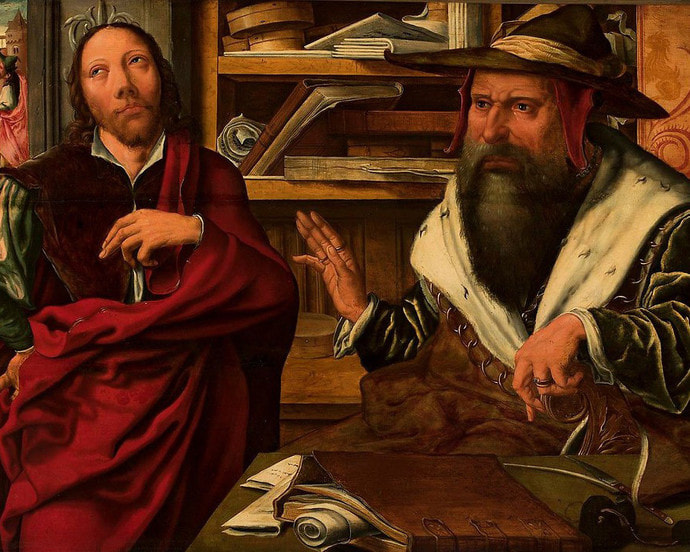|
Once it is clear that Jesus is on a path that will lead to his own death, he begins preparing his disciples for the inevitable. He begins fortifying them for not only the event of his death, but what is to come afterward. The disciples are fearful of this eventuality. Jesus stands at odds with all the leaders and authorities of the day: the scribes, the Pharisees, the high priests. All these revered and wise people who the disciples had looked up to their entire lives, and they all stand against the man the disciples follow. That in itself is enough cause for worry and internal conflict, but it’s worse than that. Sure, their attention is focused on Jesus right now. But what about when Jesus is gone? Surely their focus will shift to his followers. The disciples stand to lose everything. They are afraid, and it’s easy to understand why.
Jesus knows of their fear, and he responds “Be not afraid!” The authorities you know are not authorities at all. God is the only authority. You will face persecution and perhaps even die at their hands, but your judge is the Most High, and it is He who has the power to welcome you into the Kingdom or to cast you into Hell. If you are going to fear anything, fear Him, and hold to His commands and to he whom the Father sent. The authorities of the world mean nothing. But it’s not only the authorities who claim things that are not their own. Recall the parable of the unjust steward (Luke 16:1-13), whose master heard he had been mishandling and wasting his master’s possessions. The master demands the steward bring forth all his accounts for review. The steward is fearful for his life. He knows nobody will ever hire him again if he is found guilty, that he is not fit enough to toil in the fields, and he is too proud to become a beggar. So he calls all his master’s debtors, and reduces the debt they owe one by one, to earn their favor. His master, learning of this, commends the steward’s shrewdness. So who are we in this parable? Are we the steward? “Am I in a similar situation with no way out but to secure my future as the steward did?” Guardini says “Yes.” Not only do the earthly wise men claim authority which is not truly theirs, we all claim things which are not ours. That is, we all claim possessions. We all claim wealth. Jesus loudly proclaims, with no quibbling about economic or social systems or redistribution of wealth, “No one really owns anything.” The wealth you have, the things you possess, they are not yours. “Sin has destroyed the possibility of natural ownership without fetters upon the owner or injustice to others. In the sight of God even the most innocent ownership is unjust.” That’s the level to which sin has already destroyed the world. The things the disciples fear to lose are not theirs to begin with, indeed not even their own lives. “Whoever comes to me and does not hate father and mother, wife and children, brothers and sisters, yes, and even life itself, cannot be my disciple” (Luke 14:26). Hate. The things that matter most to us on this earth, our parents, our siblings, our children, even our own lives. We are to hate them. And why? Because in all of them, just as in our earthly possessions, lurks the enemy—that which pulls our wills away from the will to true life, away from God. Every earthly thing has the potential to pull us off that narrow path to true holiness. Indeed this urge to leap off the path within us as well. And so we are to focus on the one thing that matters: our eternal souls. This is the way Jesus prepares his disciples for what is to come. You are afraid because you are attached to the things of the world. Don’t be. You will be hated, you will be persecuted, and you may be killed. But the only thing that matters is the eternal. Guardini finishes this thought with the story of the merchant in Matthew 13:45-46, who spent his whole life buying and selling and amassing great wealth on his many travels. Then one day, he sees a great pearl. He is so astounded by it, he sells everything he has in order to have the pearl. That is how we should respond to the kingdom of heaven. It should shake us, upend everything we know and love about the world, and we should yearn for it with all of our being.
0 Comments
|
Series Info
Every day of Lent, I am writing a reflection piece on two chapters of "The Lord" by Romano Guardini. If you'd like to read or follow along, you can find the full calendar of where we're at below, or Click Here for the main landing page. Archives
April 2020
Categories
All
|

 RSS Feed
RSS Feed